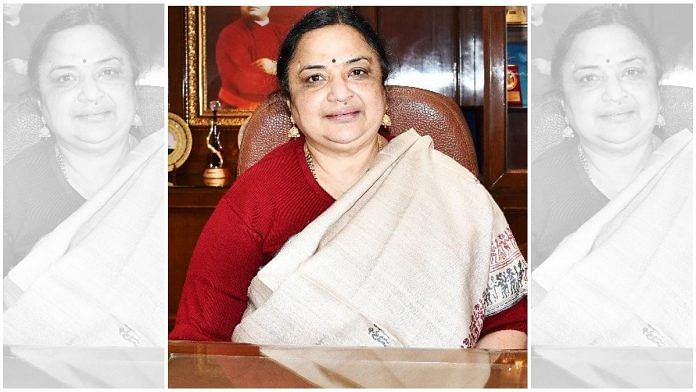New Delhi: Jawaharlal Nehru University Vice-Chancellor (V-C) Santishree D. Pandit, who took charge in February, believes that her appointment was unsettling for the “progressives” who have for years considered the institution their bastion.
“The Narendra Modi government has broken many glass ceilings with my appointment, by appointing a non-Hindi speaking Backward Caste woman as the V-C,” Pandit told ThePrint in an interview.
Prof. Pandit also said that the university is struggling with a funding deficit of Rs 130 crore as well as poor quality infrastructure, for which she blamed her predecessors.
“The hostels have not been renovated for the last 15 years and students are living in extremely poor conditions. When I spoke with Finance Minister Nirmala Sitharaman, she offered her full support for her alma mater,” Pandit said, adding that the Union Ministry of Education has already released around Rs 57 crore for renovation of the kitchens and hostels.
“The university has a fund deficit of Rs 130 crore. It is now my responsibility to make sure that the university is able to generate some finances of its own,” she said, explaining that she is working on an alumni endowment fund, offering language courses to employees of multinational corporations, and establishing academic chairs at the university.
Also Read: New JNU V-C’s statement slammed for poor language, BJP MP Varun Gandhi calls it ‘illiteracy’
‘Our university is not tukde-tukde gang’
Soon after she took charge, Pandit had courted headlines after old tweets criticising JNU students and supporting the BJP government, purportedly posted by a Twitter account carrying her name, were shared widely on social media. She had later told The Indian Express that she never had a Twitter account, and that “somebody from JNU” could have triggered the controversy.
Speaking about the controversy, Pandit said she had always supported Muslim and Christian students at Savitribai Phule Pune University, where she worked before coming to JNU, and that she is not anti-minority as is being projected.
“Anyone who knows me would know that those tweets were not a true representation of my thoughts. The information shared about me was wrong, I am a Periyar from Tamil Nadu and clearly, the men attacking me were upper caste, male, exclusivist manuvadis,” she said.
The V-C passionately objected to the use of the ‘tukde-tukde gang’ sobriquet to describe JNU, calling it “rhetoric, not reality”.
“Every university has its ‘lunatic’ elements who sit on the extreme end of any ideology, but that fringe is not representative of the university as a whole,” she added.
Calling JNU essential to the process of nation-building, she said, “Sixty per cent of our students and alumni are in the civil services, three ministers in the central cabinet of this country are from this very university. How can it be a tukde-tukde university?”
In April, after a group of Akhil Bharatiya Vidyarthi Parishad (ABVP) workers had allegedly physically assaulted JNU students over the preparation of chicken in a hostel on the occasion of Ram Navami, the V-C had in a statement said that JNU “is not anti-national”.
‘Hoping to hold student elections this year’
Talking about the JNU Students’ Union (JNUSU) elections, which have not been held for the last two years due to the Covid pandemic, Pandit said she is in favour of elections as they provide opportunity for debate and discussion. But for those looking to gain political mileage out of it, she said that “JNU is now a graveyard for political careers”.
Elaborating on the statement, she said, “We are hoping that we are able to hold student elections this year, but this time on, students will have to follow the Lyngdoh committee recommendations, which they previously had refused to abide by. The notoriety of some elements becoming the representation of the university nationally is not what I want. Students must not fight out their political battles here on this campus.”
The Lyngdoh committee recommendations — a set of guidelines outlined during the United Progressive Alliance (UPA) regime to ensure free and fair student elections in colleges — were rejected by the JNU student body in 2016.
The Executive Council of JNU had earlier this month approved the setting up of an international affairs office in the university. This, according to the V-C, will help JNU improve ties and increase collaboration with universities in other countries.
In addition to this, Pandit said, “The PMO has formed a committee to set up offshore campuses, and apart from the technical institutions, JNU is the only university which is in high demand. Fifteen countries from the African Union have requested for JNU campuses on their land.”
(Edited by Gitanjali Das)
Also Read: ‘Hindus at Iftar, Muslims at Holi’: Alumni, students say religious celebrations part of JNU culture



